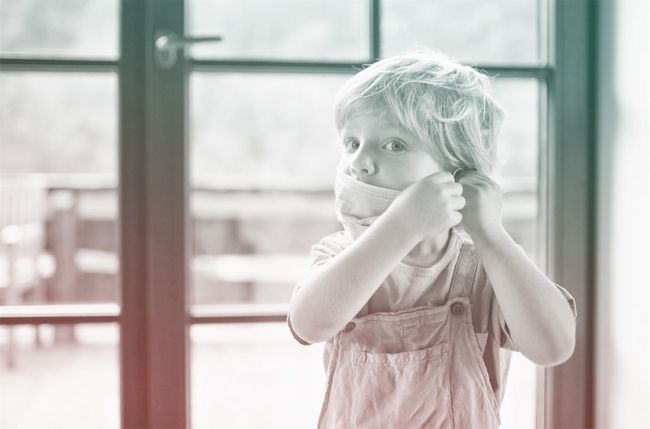Children who get COVID-19 usually experience mild cold-like symptoms, according to the Centers of Disease Control and Prevention (CDC). However, severe cases are sometimes possible in babies, toddlers, and kids. It’s no wonder that parents worry whenever their child lets out a cough!
But how can you tell the difference between a coronavirus-induced cough and one caused by normal circumstances? We spoke with an expert to break down this relatively common COVID-19 symptom.

Is Coughing a Sign of the Coronavirus?
Here’s the confounding thing about COVID-19: Patients can present with drastically different symptoms. It doesn’t help that symptoms seem to change with every new variant, including the highly contagious Omicron strain. It’s also possible to have an asymptomatic case of COVID-19; this may be especially likely if you’re fully vaccinated.
Still, coughing seems to be one of the most common signs of COVID in kids. Young people also can present with fever, fatigue, sore throat, congestion, body aches, gastrointestinal issues, and more, says the CDC. In most cases, the coronavirus seems to resemble a cold or flu in young people.
In short: Yes, coughing can be a sign of COVID-19, but a cough doesn't indicate your child has the virus.
What Does a Coronavirus Cough Sound Like?
According to Hector de Leon, M.D., pediatrician for Kaiser Permanente in Colorado, the coronavirus type of cough is often dry—meaning it doesn’t produce mucus or phlegm. It’s likely caused by irritation of the lung tissues from the virus. Other signs of a dry cough include tickling in the throat, hacking sounds, and no feeling of relief after a coughing spell.
It's important to note, though, that a percentage of COVID-19 patients report a productive wet cough instead, says Dr. de Leon. This type of cough releases mucus or phlegm, and it often comes with postnasal drip.
Because Omicron tends to settle higher in the respiratory tract, doctors are noticing another symptom in young kids: a barking cough that resembles croup. This can happen when a child’s narrow airways become inflamed or swollen. If your child develops a barking cough, it’s important to bring it up with their doctor, but experts say not to worry because croup is familiar and easily treatable.
My Child is Coughing—Do They Have COVID-19?
Parents and children everywhere are asking, "If I have a cough, do I have COVID-19?" Good question.
“There’s a lot of different reasons why people cough. It’s not always infectious,” says Dr. de Leon. “We need to consider the big picture when diagnosing coughs.” Besides COVID-19, dry or wet cough might also signal a viral illness like a cold or flu, asthma, allergies, gastroesophageal reflux disease (GERD), or irritation from environmental factors like smoke.
Try analyzing your child’s overall health. Do they also have sneezing, red eyes, and a scratchy throat? If so, their symptoms are likely from allergies, says Dr. de Leon. Similarly, if their cough gets worse after eating and comes with heartburn, the diagnosis might be GERD. “If your child isn’t struggling, if they can do the things that they normally do like play outside, it’s probably something they can manage at home,” says Dr. de Leon.
Getting tested can help you determine if your child has COVID-19. Your child may be infected if they’ve had recent exposure, or if they develop other symptoms. These generally appear 2-14 days after transmission, and they might include:
- Fever
- Sore throat
- Fatigue
- Headache
- Runny nose or congestion
- Body aches
- Gastrointestinal issues like vomiting and diarrhea
- Difficulty breathing or shortness of breath
- Loss of taste or smell
When to Call the Doctor
Alert the doctor if you think your child may have COVID-19, and ask if you should have the child tested. Always the call office before visiting; they may need to take special precautions for possible coronavirus cases. Also, “illness can often be diagnosed through a phone visit,” says Dr. de Leon. The healthcare provider will assess whether your child needs to come in for a coronavirus test.
Alert your doctor immediately for worrisome symptoms that accompany coughing, such as:
- Difficulty breathing
- Chest pain
- Bluish lips or face
- Sluggishness or inability to wake
- Harsh abdominal pain
- Signs of multisystem inflammatory syndrome in children (MIS-C): fever, rash, abdominal pain, vomiting, and/or diarrhea
How to Treat a Coronavirus Cough
To treat COVID-19, the CDC recommends staying home, getting enough rest, and monitoring your symptoms. Dr. de Leon adds that honey can soothe a dry cough, and staying hydrated also promotes a faster recovery.
Perhaps the most important thing, though, is doing what you can to stop the spread of COVID-19 to others. While children generally have mild cases, the coronavirus can be serious for elderly people and those with compromised immune systems. Caregivers should wash their hands often, disinfect surfaces regularly, and avoid sharing personal items.
